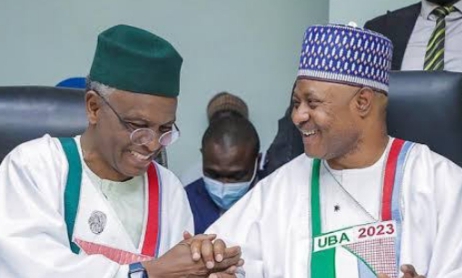By Shamsuddeen Suleiman Malami
– The Unwritten Laws of Nigerian Politics
In Nigeria, power is rarely won; it is given. It flows not from the people but from the unseen hands of political godfathers who dictate the course of elections, appointments, and governance. However, what these kingmakers often forget is that political loyalty is transactional—conditional, fragile, and, in most cases, temporary.
Across Nigeria’s political landscape, history is littered with stories of protégés turning against their benefactors once the throne is secured. From Abubakar Rimi’s rebellion against Aminu Kano to Bukola Saraki’s defiance of his father, Olusola Saraki, and even Bola Tinubu’s fallouts with former allies, the script has played out time and again.
Today, Kaduna State finds itself in the middle of yet another political rupture. Governor Uba Sani, a man whose rise to power was carefully orchestrated by Nasir El-Rufai, has broken ranks with his mentor. What was once a smooth succession plan has devolved into public acrimony, with the new governor openly declaring that his predecessor left Kaduna in a state of financial distress.
But this conflict is not just about debt figures and governance. It is a power struggle, a battle for political survival, and a lesson in the ruthless nature of Nigerian politics.
The Rise and Revolt of Uba Sani
To understand the depth of this fallout, one must first recognize the extent to which El-Rufai was instrumental in Uba Sani’s rise. Before politics, Uba Sani was known primarily as an activist with strong connections in pro-democracy circles. However, it was his alignment with El-Rufai that catapulted him into the corridors of power.
• 2015: Appointed as Special Adviser on Political Affairs to El-Rufai.
• 2019: Handpicked to contest for the Kaduna Central senatorial seat, defeating Shehu Sani.
• 2023: Anointed as El-Rufai’s preferred successor despite internal party resistance.
El-Rufai not only positioned Uba Sani within the APC hierarchy but fought to ensure his governorship candidacy, sidelining other aspirants with stronger grassroots appeal. Given this history, Uba Sani’s sudden shift against El-Rufai is not just a political surprise—it is a betrayal of the highest order.
For months, Uba Sani governed in relative silence. But when he finally spoke, his words sent shockwaves through Kaduna’s political elite:
“We are in a difficult situation. Our federal allocation is about ₦10 billion, but we lose ₦7 billion to debt servicing. This means we have only ₦3 billion left to run the state. It is a serious problem.”
This was not just an assessment of financial constraints—it was a direct indictment of El-Rufai’s tenure. And in Nigerian politics, such public denunciations are rarely forgiven.
– Kaduna’s Debt Crisis: Recklessness or Political Survival?
The true financial state of Kaduna has now become a subject of intense debate. Both Uba Sani’s revelations and the Kaduna State Assembly’s investigations have raised serious concerns.
Official Figures from El-Rufai’s Administration (2023):
• Domestic Debt: ₦80.6 billion
• Foreign Debt: $577.32 million
• Balance Left in Treasury: ₦5 billion + $2.05 million
Revised Figures Under Uba Sani’s Administration (2024):
• Domestic Debt: ₦85 billion
• Foreign Debt: $587 million
• Contractual Liabilities: 115
• Monthly Debt Servicing: ₦7 billion deducted from ₦10 billion federal allocation
Findings of the Kaduna State Assembly Investigation:
• Total Contracts Awarded: ₦510 billion
• Payments Made: ₦198.9 billion
• Unpaid Liabilities: Over ₦300 billion
• Unauthorized Withdrawals: ₦721.7 million
• Consultants Paid Without Proper Documentation: $632 million
If these figures are accurate, El-Rufai’s administration left Kaduna in deep financial trouble. However, Uba Sani’s credibility is undermined by one undeniable fact—he once defended these same loans.
In 2021, as a senator, he boldly declared:
“I am confident that Governor El-Rufai will fulfill all he has promised. I even insist that I, Senator Uba Sani, be held responsible if the governor fails.”
Today, he is singing a different tune.
This raises critical questions: Was he blind to the implications of these debts, or was his support merely an act of political convenience?
– El-Rufai’s Political Karma: The Master Betrayed
El-Rufai’s anger at Uba Sani’s betrayal is deeply ironic. If there is anyone who understands the price of political disloyalty, it is him. His career has been defined by shifting allegiances and strategic betrayals, including:
• Atiku Abubakar (2007): Once his mentor, he abandoned him and aligned with Obasanjo.
• Olusegun Obasanjo (Post-2007): The man who made him FCT Minister later became his target of criticism.
• Goodluck Jonathan (2010-2015): He distanced himself from the PDP and became one of Jonathan’s fiercest critics.
• Bola Ahmed Tinubu (2023-Present?): Once a close ally, El-Rufai’s influence in the Tinubu administration is dwindling.
His fallout with Uba Sani is simply another episode in his long history of political realignments. This time, however, he is the one being cast aside.
– A War Without Winners
The Uba Sani–El-Rufai fallout is not just a personal dispute; it is a symptom of a larger political disease. In Nigeria, political relationships are rarely built on ideology or shared vision. They are built on convenience, and when that convenience fades, betrayal follows.
Machiavelli’s The Prince teaches that power is best secured by eliminating those who helped you attain it. Orwell’s doublethink reminds us that politicians constantly rewrite history to suit their interests. And Nietzsche’s Will to Power suggests that in politics, loyalty is an illusion—self-preservation is the only truth.
Uba Sani’s actions may seem shocking, but in reality, they follow an age-old pattern. Today’s disciple is tomorrow’s dissenter. El-Rufai, once the kingmaker, now finds himself at the mercy of the very forces he once manipulated.
Yet, amidst this political drama, one group remains voiceless—the people of Kaduna. While politicians battle for dominance, ordinary citizens bear the consequences of their decisions. Schools remain underfunded, roads unfinished, and salaries unpaid, all while leaders fight over power and legacy.
In the end, the real lesson of this saga is not about betrayal, debt, or political survival. It is about the unchanging nature of Nigerian politics.
As Kaduna’s political landscape shifts, one thing is certain: the cycle will continue. Today, Uba Sani is the rebel. Tomorrow, he may be the godfather, awaiting his own inevitable betrayal.
Shamsuddeen Suleiman Malami
B.Sc. Mass Communication | Activist | Social and Political Advocate
Writes from Zaria City
📧 shamsuddeensmalami@gmail.com



